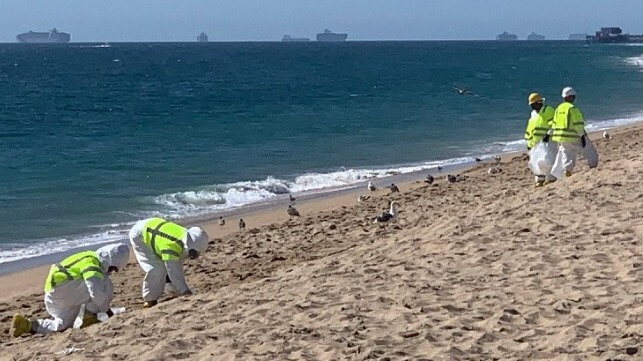MSC and Costamare Settle with Insurers as SoCal Pipeline Resumes Ops

Efforts are continuing to resolve the claims stemming from the October 2021 oil spill off Huntington Beach, California, which was attributed to damage to an undersea pipeline months early when two containerships dragged anchor during a winter storm. Without admitting responsibility, MSC Mediterranean Shipping Company and Costamare settled with the insurers of the pipeline while the operators reported that after extensive repairs, they have begun the process to restart crude production from the field and transporting oil via the pipeline.
The leak took place in October 2021 resulting in a release of an estimated 25,000 gallons of crude oil that washed ashore along Huntington Beach, California. The U.S. Coast Guard led the response which required an extensive clean-up of the shoreline and resulted in lost business for the fishing and recreational industries as well as impacting business and property owners along the coast. They are yet to release the final results of their investigation.
A survey of the pipeline however showed that its cover had cracked and it had been displaced which the U.S. Coast Guard and the operator of the pipeline, Amplify Energy, attributed to damage from vessels nine months earlier during a strong winter storm. The Coast Guard reviewing port records identified two containerships, the MSC Danit (165,000 dwt) operated by MSC, and the Beijing (107,500 dwt) owned by Costamare and operating at the time under charter to COSCO, that it reported had elected to stay in the anchorage and which appeared to have dragged anchor in the area of the pipeline during the storm. Other containerships had elected to leave the anchorage and head to sea to ride out the storm.
Amplify Energy later sued MSC and Costamare and the affiliated companies contending that the companies’ ships had improperly anchored in a restricted area and failed to notify the company, the U.S. Coast Guard, and the Marine Exchange of Southern California that they had dragged anchor during the storm. Amplify also named the Marine Exchange of Southern California in the suit as it assigned the anchoring positions of the ships and also failed to notify the company of the potential damage from the ships. The company contended that if it had been notified it would have surveyed the pipeline and likely identified the damage months before the leak occurred.
“MSC maintains that Amplify is solely responsible for events that led up to the oil spill and that their actions further worsened the pollution substantially,” MSC said confirming the settlement with Amplify Energy’s subrogated insurers. “MSC agreed to this settlement to move forward productively, and we hope this regrettable incident will encourage Amplify to recognize its responsibility as a marine operator in the waters of California.”
The shipping company highlights that Amplify pleaded guilty to criminal negligence for its role in the oil spill. The oil company also settled claims from the local authorities and with federal regulators paying out large settlements. The company’s lawsuit against the two shipping companies had been due to proceed to court but instead in March, they settled the claims for $96.5 million (gross) split between MSC and Costamare.
“The approval from federal regulatory agencies and the receipt of $85 million in net proceeds from the vessels that struck and damaged our pipeline substantially concludes a very challenging last 18 months for the company,” said Martyn Willsher, Amplify’s President and Chief Executive Officer in a statement issued on April 10.

that matters most
Get the latest maritime news delivered to your inbox daily.
Amplify announced that it was restarting production in the Beta Field. The company said initial steps to resume full operations involved filling the San Pedro Bay Pipeline with production, a process which commenced over the prior weekend and is expected to take approximately two weeks to complete.
Amplify carried out significant repairs on the San Pedro Bay pipeline that involved removing and installing replacements for the damaged segments. The repaired pipeline also underwent a series of safety integrity tests as required by both federal pipeline safety regulations and PHMSA corrective action order. The 16-inch subsea pipeline extends 17.5 miles from a platform to an onshore pump station, metering, and tankage at the Port of Long Beach. The company also previously agreed with regulators to take steps to improve its monitoring, training, and safety procedures after allegations that it was slow to recognize and take responsibility for the leak and shut down the pipeline. Before the pipeline rupture, the company was producing roughly 24,000 boe/d from the field.
